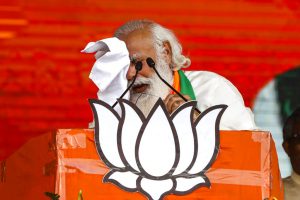The political row that erupted in India over an allegedly “leaked” political document of the opposition Congress party has become emblematic of the state of affairs of the country. This document – or “toolkit,” as it is referred to in the media – appeared to contain detailed instructions to party members on how to corner the government over the mishandling of the pandemic. The screenshots of the document were widely shared on social media by senior Bharatiya Janata Party (BJP) leaders who denounced a wide-ranging conspiracy, involving domestic and international media, activists, and the opposition, to defame Prime Minister Narendra Modi and undermine the government.
The Congress rejected the charge, calling the document a forgery and a crude attempt by the government to deflect attention from its failures. This controversy has now dragged in Twitter, which added a “manipulated media” warning to a post from a BJP spokesperson sharing the document, lending credence to the Congress’ stand. The government promptly reacted by sending Twitter a warning of its own, in the shape of a posse of Delhi Police Special Cell officers at its office doors.
As this round of political skullduggery played out on television screens, India’s official COVID-19 death toll darted past the 300,000 mark. This is widely believed to be a massive underestimate, with a recent New York Times Model estimating that the likely death toll would be around 1.6 million.
Perhaps the most troubling part of the whole “toolkit” episode is that we will likely never know the truth. The institutions of the country which helped the citizenry arrive at a reasonable consensus on the facts of an issue – media, police, judiciary – have been relentlessly corroded over the last many years by the ruling party. Even when they might act in an impartial manner, many people would simply refuse to believe their findings, especially in a politically sensitive case. There is a general breakdown of trust in the country, which characterizes every democratic relationship: between the government and the opposition, between the central government and the state governments, and between the citizen and the public institutions. Every normal process of governance has been overtaken by intense partisan squabbling. The subject of vaccine procurement and distribution has for months remained a site of bitter conflict between states and central government, with little credible information filtering down to the public.
In the absence of this trust, India has become the land of conspiracy theories, encouraged by a government which has unabashedly embraced a paranoid style of politics. A few months ago, in the midst of the farmer protests, the government launched a high-profile investigation charging a 22-year-old climate activist as being at the center of a worldwide conspiracy to defame India. This seditious network allegedly stretched from Greta Thunberg to Khalistani separatists, and, among other things, wanted to malign Indian tea and yoga, as Modi claimed.
During the pandemic, many in the cultural ecosystem of the BJP – including the Health Minister at some occasions – have encouraged alternative COVID-19 treatments, which can range from Ayurveda medicines to cow dung. A key social and business ally of the government, the yoga guru Baba Ramdev, has found himself in a media war with the country’s medical establishment after claiming that hundreds of thousands of people have died after taking “allopathic” Western medicine.
The political opponents of the government are also far from immune to the new conspiratorial culture. Opposition politicians routinely fuel the belief that the Electronic Voting Machines (EVMs) are “hacked” in favor of the government. In January, the former Uttar Pradesh Chief Minister Akhilesh Yadav declared that he could not trust “BJP’s vaccine.” Last month, a report from the farmer’s protest on the outskirts of Delhi found that many protesters believed the pandemic to be “a conspiracy of the Modi government” to end their protests.
It has been India’s neighbor Pakistan that has long been held to be the hub of conspiracy theories. There was some consensus on the genesis of the Pakistani appetite for conspiracies: a heavily controlled media and routine disinformation campaigns by the state-military apparatus that left people cynical about the official version of events. In such a context, conspiracies allowed people to make sense of events, in line with their own intuitions and biases. This is not far from the currently prevailing condition of India. With a government which feels threatened of the potential fallout of the pandemic, and an opposition that senses a uniquely potent opportunity to discredit it, the country might just be in for wackier times.

































